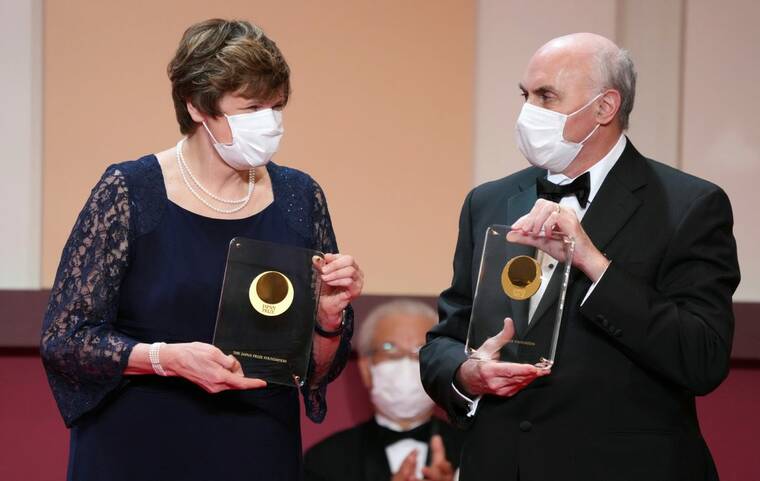Nobel Prize in Physiology or Medicine Awarded to Katalin Karikó and Dr. Drew Weissman
Katalin Karikó and Dr. Drew Weissman, esteemed researchers who made a groundbreaking discovery in modifying messenger RNA (mRNA), have been honored with the Nobel Prize in physiology or medicine. Their groundbreaking work has paved the way for the development of highly effective COVID-19 vaccines in record time, preventing millions of deaths and aiding in global recovery from the pandemic.
The mRNA technology developed by Karikó and Weissman has revolutionized vaccine production and has been instrumental in the creation of COVID-19 vaccines administered billions of times worldwide. Furthermore, this innovative approach has laid the groundwork for future vaccines that could protect against a range of deadly diseases, including cancer.
Despite their incredible achievements, the researchers’ progress has faced opposition, particularly from the anti-vaccine movement in the United States. Critics often cite the rapid development of the COVID-19 vaccines as a basis for distrust. However, the reality is that the breakthroughs behind these vaccines were the result of years of meticulous research conducted at the University of Pennsylvania, where Weissman leads a lab.
Weissman received the news of the Nobel Prize when Karikó texted him at 4 a.m. and asked if he had heard from Thomas yet. Confused, Weissman asked who Thomas was, to which Karikó replied that Thomas was from the Nobel committee and was trying to reach Weissman for his phone number.
For Karikó, being awarded the Nobel Prize is a significant milestone after years of struggling for funding and a permanent academic position. She persevered by collaborating with senior scientists at the University of Pennsylvania, despite facing financial challenges. Although she was denied grants and forced to retire from the university a decade ago, Karikó continues her research as an adjunct professor while pursuing plans to start a company with her daughter, Susan Francia, a two-time Olympic gold medalist in rowing and an MBA graduate.
Karikó’s perseverance stemmed from her belief in the potential of mRNA, which serves as a vital component in cells’ protein synthesis. Despite the skepticism surrounding mRNA’s clinical viability, Karikó remained steadfast in her conviction that it could revolutionize medical advancements. Her paths crossed with Weissman’s in 1998 at the University of Pennsylvania, where they encountered each other near a copy machine.
Weissman, who had been striving to develop an HIV vaccine for years, saw an opportunity to collaborate with Karikó and explore the potential of mRNA. At the time, it seemed like an implausible idea, as mRNA was fragile and triggered an immune response when introduced to cells. However, after numerous failed experiments and setbacks, the researchers discovered that cells naturally protect their own mRNA through a specific chemical modification. By replicating this modification in lab-synthesized mRNA, they successfully bypassed the immune response.
This groundbreaking discovery reshaped our understanding of how mRNA interacts with the immune system. The panel that awarded the Nobel Prize acknowledged the significant contribution of Karikó and Weissman’s work, stating that it paved the way for the rapid development of vaccines during the COVID-19 pandemic, one of the greatest threats to human health in recent history.
Initially, the scientific community showed little interest in adopting the mRNA approach to vaccination. Major journals like Nature and Science rejected their 2005 paper, but it found acceptance in a niche publication, Immunity. However, biotech companies Moderna and BioNTech eventually recognized its potential. Karikó later joined BioNTech as a senior vice president, and both companies conducted extensive studies on mRNA vaccines for various diseases.
When the COVID-19 pandemic hit, Karikó and Weissman’s research aligned with other crucial findings from around the world that allowed vaccine developers to respond swiftly. These discoveries included methods to safely deliver delicate mRNA molecules to human cells and techniques to stabilize the spike protein used by coronaviruses to invade cells. In late 2020, less than a year into the pandemic, regulatory bodies authorized the emergency use of highly effective mRNA vaccines produced by Pfizer-BioNTech and Moderna.
Since then, hundreds of millions of doses of these vaccines have been administered worldwide, with the flexibility of mRNA technology allowing for updates to combat emerging virus variants. mRNA vaccines are now being explored for diseases like influenza, malaria, and HIV, where traditional vaccination methods face significant challenges. Moreover, personalized cancer vaccines using mRNA tailored to individual patients’ tumors have shown promise.
Karikó’s journey to the Nobel Prize was marked by years of perseverance on the fringes of academia. In an interview with the University of Pennsylvania, she recalled her mother’s annual hope that she would win the Nobel Prize. Karikó would respond with her struggle to secure grants. Her recognition as the 13th female recipient of the Nobel Prize in physiology or medicine since 1901 underscores the significant gender disparity in scientific fields and awards.
While the Nobel Prize in physiology or medicine marks the first of six prizes to be awarded this year, it serves as a testament to the transformative nature of Karikó and Weissman’s work. Their dedicated research laid the foundation for the rapid vaccine technology deployment witnessed in 2020, made possible through global collaboration.
Other Nobel Prize Announcements
- The Nobel Prize in Physics will be awarded on Tuesday by the Royal Swedish Academy of Sciences in Stockholm.
- The Nobel Prize in Chemistry…
Denial of responsibility! Vigour Times is an automatic aggregator of Global media. In each content, the hyperlink to the primary source is specified. All trademarks belong to their rightful owners, and all materials to their authors. For any complaint, please reach us at – [email protected]. We will take necessary action within 24 hours.


